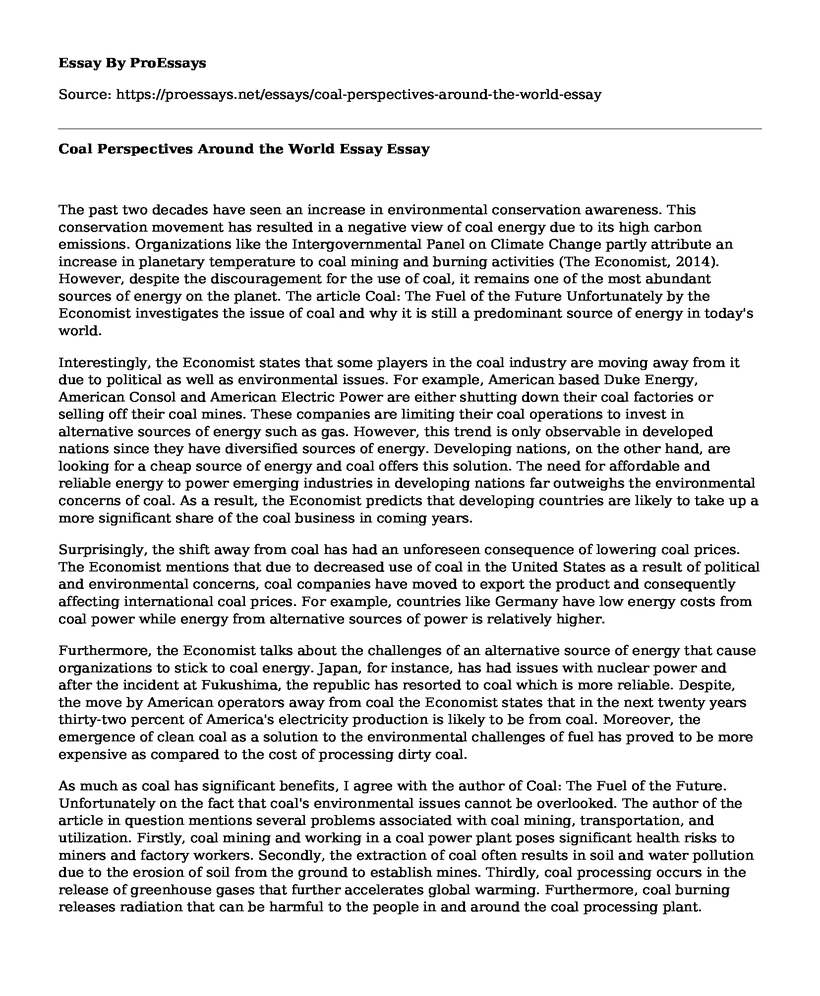The past two decades have seen an increase in environmental conservation awareness. This conservation movement has resulted in a negative view of coal energy due to its high carbon emissions. Organizations like the Intergovernmental Panel on Climate Change partly attribute an increase in planetary temperature to coal mining and burning activities (The Economist, 2014). However, despite the discouragement for the use of coal, it remains one of the most abundant sources of energy on the planet. The article Coal: The Fuel of the Future Unfortunately by the Economist investigates the issue of coal and why it is still a predominant source of energy in today's world.
Interestingly, the Economist states that some players in the coal industry are moving away from it due to political as well as environmental issues. For example, American based Duke Energy, American Consol and American Electric Power are either shutting down their coal factories or selling off their coal mines. These companies are limiting their coal operations to invest in alternative sources of energy such as gas. However, this trend is only observable in developed nations since they have diversified sources of energy. Developing nations, on the other hand, are looking for a cheap source of energy and coal offers this solution. The need for affordable and reliable energy to power emerging industries in developing nations far outweighs the environmental concerns of coal. As a result, the Economist predicts that developing countries are likely to take up a more significant share of the coal business in coming years.
Surprisingly, the shift away from coal has had an unforeseen consequence of lowering coal prices. The Economist mentions that due to decreased use of coal in the United States as a result of political and environmental concerns, coal companies have moved to export the product and consequently affecting international coal prices. For example, countries like Germany have low energy costs from coal power while energy from alternative sources of power is relatively higher.
Furthermore, the Economist talks about the challenges of an alternative source of energy that cause organizations to stick to coal energy. Japan, for instance, has had issues with nuclear power and after the incident at Fukushima, the republic has resorted to coal which is more reliable. Despite, the move by American operators away from coal the Economist states that in the next twenty years thirty-two percent of America's electricity production is likely to be from coal. Moreover, the emergence of clean coal as a solution to the environmental challenges of fuel has proved to be more expensive as compared to the cost of processing dirty coal.
As much as coal has significant benefits, I agree with the author of Coal: The Fuel of the Future. Unfortunately on the fact that coal's environmental issues cannot be overlooked. The author of the article in question mentions several problems associated with coal mining, transportation, and utilization. Firstly, coal mining and working in a coal power plant poses significant health risks to miners and factory workers. Secondly, the extraction of coal often results in soil and water pollution due to the erosion of soil from the ground to establish mines. Thirdly, coal processing occurs in the release of greenhouse gases that further accelerates global warming. Furthermore, coal burning releases radiation that can be harmful to the people in and around the coal processing plant.
Conclusion
In conclusion, I agree with the Economist on the fact that coal, as it is now, is likely to be relied on as a source of energy due to its abundance and ease of mining. However, if the cost of environmental damage, as well as the cost of treating coal-associated illnesses, are factored into the coal business then its profit margins will be significantly reduced. This move will ultimately encourage the use of coal as alternatives will be seen as being more cost saving, or it may even promote the use of clean coal.
References
The Economist. (2014, April 16). Coal: The fuel of the future, unfortunately. Retrieved September 12, 2018, from https://www.economist.com/business/2014/04/16/the-fuel-of-the-future-unfortunately
Cite this page
Coal Perspectives Around the World Essay. (2022, Jul 25). Retrieved from https://proessays.net/essays/coal-perspectives-around-the-world-essay
If you are the original author of this essay and no longer wish to have it published on the ProEssays website, please click below to request its removal:
- Essay Example: Antitrust Legislation
- Overview and Management of Ooredoo Oman and Econet Wireless Burundi
- Earthquake in Nepal and Its Aftermath Essay
- Paper Example on Greenhouse Gas Emissions and Climate Change
- Essay Sample on Zero Waste Management
- Terrorism in 21st Century: Exploring the Use of Social Noise - Essay Sample
- Paper Example on GDP: Aggregate Traded Income or Products & Services?







